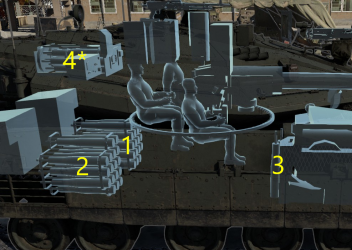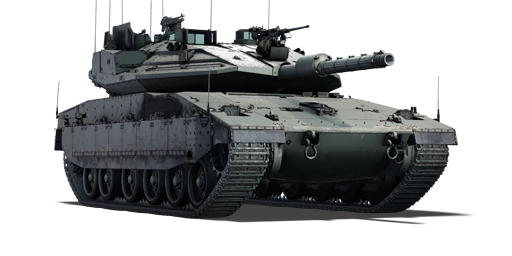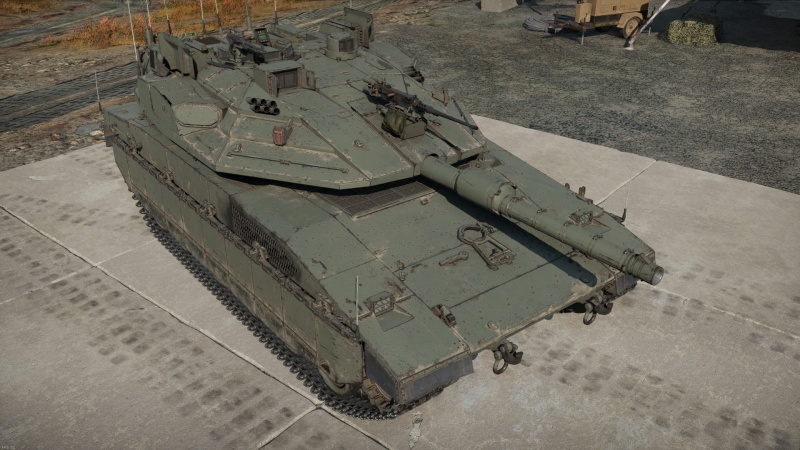Difference between revisions of "Merkava Mk.4M"
(→Ammunition) |
U124382833 (talk | contribs) (→History) |
||
| Line 138: | Line 138: | ||
== History == | == History == | ||
<!-- ''Describe the history of the creation and combat usage of the vehicle in more detail than in the introduction. If the historical reference turns out to be too long, take it to a separate article, taking a link to the article about the vehicle and adding a block "/History" (example: <nowiki>https://wiki.warthunder.com/(Vehicle-name)/History</nowiki>) and add a link to it here using the <code>main</code> template. Be sure to reference text and sources by using <code><nowiki><ref></ref></nowiki></code>, as well as adding them at the end of the article with <code><nowiki><references /></nowiki></code>. This section may also include the vehicle's dev blog entry (if applicable) and the in-game encyclopedia description (under <code><nowiki>=== In-game description ===</nowiki></code>, also if applicable).'' --> | <!-- ''Describe the history of the creation and combat usage of the vehicle in more detail than in the introduction. If the historical reference turns out to be too long, take it to a separate article, taking a link to the article about the vehicle and adding a block "/History" (example: <nowiki>https://wiki.warthunder.com/(Vehicle-name)/History</nowiki>) and add a link to it here using the <code>main</code> template. Be sure to reference text and sources by using <code><nowiki><ref></ref></nowiki></code>, as well as adding them at the end of the article with <code><nowiki><references /></nowiki></code>. This section may also include the vehicle's dev blog entry (if applicable) and the in-game encyclopedia description (under <code><nowiki>=== In-game description ===</nowiki></code>, also if applicable).'' --> | ||
| − | '' | + | Due to the relatively small size of the Israeli Defense Force (IDF) compared to some of its potential opponents, Israel's military doctrine is ever focused on protecting its highly-trained personnel from harm during combat. This is typically achieved by fielding advanced technology designed to reduce casualties. Nowhere is this seen more clearly than in the design of the Merkava tank. Beyond its rare configuration placing the engine at the front to soak up penetrating rounds, as well as the "Hairs of Shulamit" passive protective chains around the rear of the tank's turret, in the early 2000s Israel began simultaneous development of two Active Protection Systems (APS) designed to intercept and kill incoming anti-tank weaponry. |
| + | |||
| + | One of these two systems is called "Me'il Ruach" (Windbreaker Jacket, or simply Windbreaker), which was developed by Israel's Rafael Advanced Defense Systems. The Windbreaker system contains a high-precision radar and four flat-panel antennae, designed to detect incoming projectiles such as HEAT rounds, ATGMs, RPGs, and any other "slow" chemical warheads. Once an incoming projectile is detected, the system quickly calculates its exact flight trajectory and determines the optimal timing for interception. Two launchers on either side of the turret can quickly rotate in any direction to fire a pack of Explosively-Formed Projectiles at the warhead and detonate it before it can impact with the tank. This is effectively a very tight shotgun blast of tiny pellets which trigger the warhead by directly impacting with it. If the system determines that the enemy projectile will not impact with the tank, it does not fire the pellets at all. | ||
| + | |||
| + | The extreme accuracy of the radar, the precise trajectory calculation and the tight cone of pellets do not only increase the chance of detonating the warhead to approximately 90-95% (100% in operational history); they also significantly reduce the risk to any friendly infantry who might be adjacent to the tank as the system fires. This was set as a prerequisite before development ever began. Furthermore, the system alerts the tank crew to the direction the attack came from, allowing them to return fire quickly and effectively. | ||
| + | |||
| + | The Windbreaker system was first installed onto a platoon of operational Merkava Mk.4 tanks in 2009. The upgraded model was renamed Merkava Mk.4M, with the M being the first letter in the system's Hebrew name ("Me'il Ruach"). The IDF's 401st Armored Regiment was the first to be fully equipped with Merkava Mk.4Ms in 2012. Today, all new Israeli-produced tanks are Merkava Mk.4Ms; all Merkava Mk.4 tanks in service in the IDF have been upgraded to Merkava Mk.4M standards; and the Windbreaker system is also known to feature on some older Merkava Mk.3D models. | ||
| + | |||
| + | Windbreaker became the first fully-operational hard-kill APS in any West-aligned army, and to this day is the only mass-produced system of this type outside of Russia and China. It was first tested in battle in 2011, when it intercepted an RPG fired by Hamas combatants at a Merkava Mk.4M on the border of the Gaza Strip. During Operation Protective Edge in 2014, Windbreaker systems reportedly intercepted a total of 15 enemy warheads, including Metis, Konkurs and Kornet ATGMs. As of 2023, the system has maintained a 100% operational success rate in combat. | ||
| + | |||
| + | The development of Windbreaker quickly drew the attention of the United States Army, which first purchased a light version of the system for protecting its Oshkosh M-ATVs. In the United States military, the system is named "Trophy". In 2017, the U.S. Army ordered 100 heavy-model Trophy units for installation on M1A2 Abrams tanks, enough to outfit an entire regiment. In 2019 the Army ordered enough systems to outfit three additional regiments. Germany was also an early adopter of the Trophy system, installing it into its state-of-the-art Leopard 2A7A1. Reportedly, the British army is currently planning on installing the Trophy system into its future Challenger 3 tank, though trials are proceeding concurrently for other APS systems. | ||
== Media == | == Media == | ||
Revision as of 10:17, 13 February 2023
| This page is about the Israeli medium tank Merkava Mk.4M. For other versions, see Merkava (Family). |
Contents
Description
The Merkava Siman 4M is a rank Israeli medium tank with a battle rating of (AB), (RB), and (SB). It was introduced in Update "Wind of Change".
General info
Survivability and armour
Describe armour protection. Note the most well protected and key weak areas. Appreciate the layout of modules as well as the number and location of crew members. Is the level of armour protection sufficient, is the placement of modules helpful for survival in combat? If necessary use a visual template to indicate the most secure and weak zones of the armour.
Armour type:
| Armour | Front (Slope angle) | Sides | Rear | Roof |
|---|---|---|---|---|
| Hull | ___ mm | ___ mm Top ___ mm Bottom |
___ mm | ___ - ___ mm |
| Turret | ___ - ___ mm Turret front ___ mm Gun mantlet |
___ - ___ mm | ___ - ___ mm | ___ - ___ mm |
| Cupola | ___ mm | ___ mm | ___ mm | ___ mm |
Notes:
Mobility
| Game Mode | Max Speed (km/h) | Weight (tons) | Engine power (horsepower) | Power-to-weight ratio (hp/ton) | |||
|---|---|---|---|---|---|---|---|
| Forward | Reverse | Stock | Upgraded | Stock | Upgraded | ||
| Arcade | Expression error: Unexpected * operator. | 2,325 | Expression error: Unexpected round operator. | __.__ | |||
| Realistic | 1,327 | Expression error: Unexpected round operator. | __.__ | ||||
Modifications and economy
Armaments
Main armament
| 120 mm IMI MG251 | Turret rotation speed (°/s) | Reloading rate (seconds) | |||||||||||
|---|---|---|---|---|---|---|---|---|---|---|---|---|---|
| Mode | Capacity | Vertical | Horizontal | Stabilizer | Stock | Upgraded | Full | Expert | Aced | Stock | Full | Expert | Aced |
| Arcade | 46 | -7°/+20° | ±180° | Two-plane | 32.4 | 44.8 | 54.4 | 60.2 | 64.0 | 8.71 | 7.70 | 7.10 | 6.70 |
| Realistic | 20.2 | 23.8 | 28.9 | 32.0 | 34.0 | ||||||||
Ammunition
| Penetration statistics | |||||||
|---|---|---|---|---|---|---|---|
| Ammunition | Type of warhead |
Penetration @ 0° Angle of Attack (mm) | |||||
| 10 m | 100 m | 500 m | 1,000 m | 1,500 m | 2,000 m | ||
| M325 | HEATFS | 480 | 480 | 480 | 480 | 480 | 480 |
| M339 | HE-TF | 65 | 65 | 60 | 58 | 53 | 50 |
| M322 | APFSDS | 589 | 586 | 577 | 565 | 553 | 541 |
| M338 | APFSDS | 611 | 608 | 597 | 585 | 573 | 560 |
| Shell details | ||||||||||||
|---|---|---|---|---|---|---|---|---|---|---|---|---|
| Ammunition | Type of warhead |
Velocity (m/s) |
Projectile mass (kg) |
Fuse delay (m) |
Fuse sensitivity (mm) |
Explosive mass (TNT equivalent) (kg) |
Ricochet | |||||
| 0% | 50% | 100% | ||||||||||
| M325 | HEATFS | 1,078 | 15.81 | 0.05 | 0.1 | 2.36 | 65° | 72° | 77° | |||
| M339 | HE-TF | 900 | 17 | 1.5 | 3 | 3.66 | 79° | 80° | 81° | |||
| M322 | APFSDS | 1,705 | 5.6 | - | - | - | 78° | 80° | 81° | |||
| M338 | APFSDS | 1,680 | 5.06 | - | - | - | 78° | 80° | 81° | |||
Ammo racks

| Full ammo |
1st rack empty |
2nd rack empty |
3rd rack empty |
4th rack empty |
Visual discrepancy |
|---|---|---|---|---|---|
| 46 | 30 (+16) | 13 (+33) | 11 (+35) | 1 (+45) | No |
Machine guns
| 12.7 mm M2HB | ||||
|---|---|---|---|---|
| Mount | Capacity (Belt) | Fire rate | Vertical | Horizontal |
| Coaxial | 1,000 (200) | 577 | N/A | N/A |
| 7.62 mm FN MAG 60-40 | ||||
|---|---|---|---|---|
| Mount | Capacity (Belt) | Fire rate | Vertical | Horizontal |
| Coaxial | 6,000 (200) | 600 | N/A | N/A |
| Pintle | 1,800 (200) | 600 | -5°/+50° | -60°/+120° |
Usage in battles
Describe the tactics of playing in the vehicle, the features of using vehicles in the team and advice on tactics. Refrain from creating a "guide" - do not impose a single point of view but instead give the reader food for thought. Describe the most dangerous enemies and give recommendations on fighting them. If necessary, note the specifics of the game in different modes (AB, RB, SB).
Pros and cons
Pros:
- Powerful APFSDS round
- Trophy System will stop most missiles
- HE-TF can help with fighting against helicopters
- Access to Commander and Gunner thermals
Cons:
- Engine is at the front of the tank and any penetrating hit to the UFP will result in a stranded tank
- Upper front plate is weaker than those of other nations' tanks
History
Due to the relatively small size of the Israeli Defense Force (IDF) compared to some of its potential opponents, Israel's military doctrine is ever focused on protecting its highly-trained personnel from harm during combat. This is typically achieved by fielding advanced technology designed to reduce casualties. Nowhere is this seen more clearly than in the design of the Merkava tank. Beyond its rare configuration placing the engine at the front to soak up penetrating rounds, as well as the "Hairs of Shulamit" passive protective chains around the rear of the tank's turret, in the early 2000s Israel began simultaneous development of two Active Protection Systems (APS) designed to intercept and kill incoming anti-tank weaponry.
One of these two systems is called "Me'il Ruach" (Windbreaker Jacket, or simply Windbreaker), which was developed by Israel's Rafael Advanced Defense Systems. The Windbreaker system contains a high-precision radar and four flat-panel antennae, designed to detect incoming projectiles such as HEAT rounds, ATGMs, RPGs, and any other "slow" chemical warheads. Once an incoming projectile is detected, the system quickly calculates its exact flight trajectory and determines the optimal timing for interception. Two launchers on either side of the turret can quickly rotate in any direction to fire a pack of Explosively-Formed Projectiles at the warhead and detonate it before it can impact with the tank. This is effectively a very tight shotgun blast of tiny pellets which trigger the warhead by directly impacting with it. If the system determines that the enemy projectile will not impact with the tank, it does not fire the pellets at all.
The extreme accuracy of the radar, the precise trajectory calculation and the tight cone of pellets do not only increase the chance of detonating the warhead to approximately 90-95% (100% in operational history); they also significantly reduce the risk to any friendly infantry who might be adjacent to the tank as the system fires. This was set as a prerequisite before development ever began. Furthermore, the system alerts the tank crew to the direction the attack came from, allowing them to return fire quickly and effectively.
The Windbreaker system was first installed onto a platoon of operational Merkava Mk.4 tanks in 2009. The upgraded model was renamed Merkava Mk.4M, with the M being the first letter in the system's Hebrew name ("Me'il Ruach"). The IDF's 401st Armored Regiment was the first to be fully equipped with Merkava Mk.4Ms in 2012. Today, all new Israeli-produced tanks are Merkava Mk.4Ms; all Merkava Mk.4 tanks in service in the IDF have been upgraded to Merkava Mk.4M standards; and the Windbreaker system is also known to feature on some older Merkava Mk.3D models.
Windbreaker became the first fully-operational hard-kill APS in any West-aligned army, and to this day is the only mass-produced system of this type outside of Russia and China. It was first tested in battle in 2011, when it intercepted an RPG fired by Hamas combatants at a Merkava Mk.4M on the border of the Gaza Strip. During Operation Protective Edge in 2014, Windbreaker systems reportedly intercepted a total of 15 enemy warheads, including Metis, Konkurs and Kornet ATGMs. As of 2023, the system has maintained a 100% operational success rate in combat.
The development of Windbreaker quickly drew the attention of the United States Army, which first purchased a light version of the system for protecting its Oshkosh M-ATVs. In the United States military, the system is named "Trophy". In 2017, the U.S. Army ordered 100 heavy-model Trophy units for installation on M1A2 Abrams tanks, enough to outfit an entire regiment. In 2019 the Army ordered enough systems to outfit three additional regiments. Germany was also an early adopter of the Trophy system, installing it into its state-of-the-art Leopard 2A7A1. Reportedly, the British army is currently planning on installing the Trophy system into its future Challenger 3 tank, though trials are proceeding concurrently for other APS systems.
Media
- Skins
- Videos
See also
Links to the articles on the War Thunder Wiki that you think will be useful for the reader, for example:
- reference to the series of the vehicles;
- links to approximate analogues of other nations and research trees.
External links
| Israeli Ordnance Corps (חיל החימוש) | |
|---|---|
| Medium Tanks | M-51 · M-51 (W) |
| MBTs | |
| Magach | Magach 1 · Magach 2 · Magach 3 · Magach 3 (ERA) · ▃Magach 3 (ERA) · Magach 5 |
| Magach 6 · Magach 6A · Magach 6B · Magach 6C · Magach 6R · Magach 6M · Gal Batash | |
| Sho't | Sho't · Sho't Kal Alef · Sho't Kal Gimel · Sho't Kal Dalet · ▄Sho't Kal Dalet |
| Tiran | Tiran 4 · Tiran 4S |
| Merkava | ▃Merkava Mk.1 · Merkava Mk.1B · Merkava Mk.2B · ▃Merkava Mk.2B · Merkava Mk.2D |
| Merkava Mk.3B · Merkava Mk.3C · ▃Merkava Mk.3D · Merkava Mk.4B · Merkava Mk.4M | |
| Tank destroyers | Zachlam Tager |
| See Also | Chrysler Defense · Department of Tank Design · Morozov Design Bureau |
| Israel medium tanks | |
|---|---|
| M-51 | M-51 · M-51 (W) |
| Magach | Magach 1 · Magach 2 · Magach 3 · Magach 3 (ERA) · Magach 5 · Magach 6 |
| Magach 6A · Magach 6B · Magach 6B Gal · Gal Batash · Magach 6C · Magach 6M · Magach 6R · Magach Hydra · Magach 7C | |
| Tiran | Tiran 4 · Tiran 4S · Tiran 6 |
| Sho't | Sho't · Sho't Kal Alef · Sho't Kal Gimel · Sho't Kal Dalet |
| Merkava | Merkava Mk.1B · Merkava Mk.2B · Merkava Mk.2D · Merkava Mk.3B · Merkava Mk.3C · Ra'am Sagol |
| Merkava Mk.4B · Merkava Mk.4M · Merkava Mk.4 LIC | |





